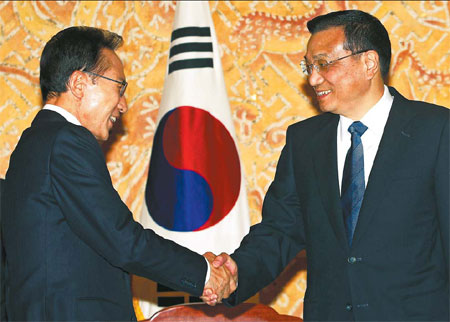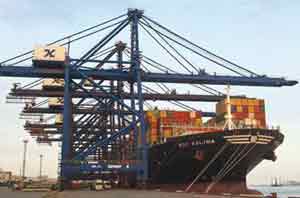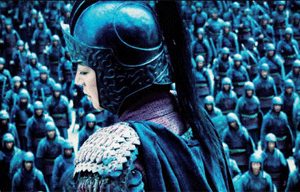Call to play key role for peace
Updated: 2011-10-27 08:04
By Wu Jiao and Zhao Shengnan (China Daily)
|
|||||||||
|
Vice-Premier Li Keqiang meets the President of the Republic of Korea Lee Myung-bak at the presidential residence in Seoul on Wednesday during his two-day visit to the country. Ahn Young-Joon / Associated Press |
ROK leader hails Beijing's efforts as vice-premier kicks off visit
SEOUL / BEIJING - Lee Myung-bak, the president of the Republic of Korea (ROK), called on Wednesday on China to play a key role on issues related to the Korean Peninsula amid a flurry of diplomacy to revive long-stalled talks on the Democratic People's Republic of Korea's (DPRK) nuclear program.
"The ROK appreciates China's constructive role and is willing to work with the parties concerned to push the denuclearization process forward," Lee said during talks with Vice-Premier Li Keqiang, who arrived in Seoul on Wednesday.
| ||||
Li said maintaining peace and stability served the interests of countries in the region.
Due to the efforts of the relevant parties, the situation on the peninsula had eased lately, Li said. China hoped that the various parties could maintain and cement the momentum of detente to achieve an early resumption of the Six-Party Talks and realize the denuclearization of the peninsula.
China sincerely supported the ROK and the DPRK in improving relations through dialogue, Li said.
Li's back-to-back visits to the two Koreas, a rare occurrence in the world of diplomacy, have been widely interpreted as a push for progress on the stalled talks that involve China, the two Koreas, Russia, the US and Japan.
Efforts have been made on the diplomatic front in recent months to rekindle the talks. The most recent talks between the DPRK and the US ended on Tuesday in Geneva. Talks were also held in July.
Stephen Bosworth, the outgoing US special envoy on the DPRK, described the two-day Geneva talks on Tuesday as "very positive and generally constructive".
The DPRK's chief delegate, First Vice-Foreign Minister Kim Kye-gwan, said "big progress" had been made and the two sides had agreed to meet again.
But US State Department spokeswoman Victoria Nuland downplayed the results, saying "we haven't had any breakthroughs here and significant issues do remain".
US Defense Secretary Leon Panetta, who also visited the ROK on Wednesday, was quoted by AFP as saying that the US is to keep a "nuclear umbrella" over the ROK.
The ROK's nuclear envoy Lim Sung-nam left on Wednesday for Moscow to meet his Russian counterpart Alexei Borodavkin and other senior officials.
"At this time, when two rounds of inter-Korean and North Korea-US meetings have been wrapped up, we will review progress and discuss future moves," Lim told Yonhap news agency.
Experts said that recent activities boosted hopes that the talks will be restarted and that China is playing a key role in the process.
According to Charles K. Armstrong, a professor of Korean Studies at Columbia University in New York, China has played an important mediating role between the US and the DPRK.
"The most important role that the Six-Party Talks play is to serve as a forum for discussion between the US and the DPRK, and also between North and South Korea, given that the real conflict at the heart of the negotiation is between the US and the DPRK over the nuclear program.
"In that sense, China's role is very important as a host and mediator."
Edward Shultz, an expert on Korean studies at the University of Hawaii, said: "Talking is much better ... Trust must be reestablished among all parties."
The ROK and China also agreed on Wednesday to expand their currency swap agreement to the equivalent of $56.5 billion in the face of global uncertainty and financial turmoil.
The existing won-yuan swap arrangement, reached in April 2009, was worth the equivalent of $33.5 billion at the current won-dollar exchange rate.
The Bank of Korea said in a notice on its website that its new deal with the People's Bank of China would last until Oct 25, 2014.
A currency swap allows central banks to exchange their currencies with each other in case of a liquidity crunch.
The new swap deals will help both countries secure extra liquidity in a worst-case scenario.
Li also met ROK Prime Minister Kim Hwang-sik to discuss bilateral relations and regional peace.
Deputy Commerce Minister Chen Jian, who is accompanying Li on his visit to the ROK, said on Wednesday that economic and trade cooperation is the focus of the two-day visit.
Chen said trade between China and the ROK has experienced tremendous growth, reaching $207.2 billion in 2010, a year-on-year jump of 32.6 percent.
AFP, Xinhua, Chen Weihua and Tan Yingzi in the US contributed to this story.
China Daily















